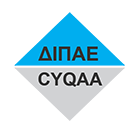
Magister Scientiae (Msc)
90 ects
Greek
Internationally Recognised
Online application submission

Criminal Justice, as a scientific field, experiences rapid growth in our times. The Postgraduate Programme of Study in Criminal Justice designed by the Open University of Cyprus aims to expand knowledge, to develop skills and to promote critical thinking of individuals who already work in this field or who are interested in joining it. In parallel, it prepares students and professionals in the discussed field to further advance in postgraduate level studies as well as in scientific research.
The Master’s degree in Criminal Justice consists of 90 ECTS units and offers two (2) academic directions:
- Contemporary Crime and Corruption
- Police Administration and Leadership
The Thematic Units included in the Postgraduate Programme offer a general overview of the field of criminal justice, such as: organized crime; European criminal law; comparative police administration; cyber-crime; international terrorism; and other. Upon successful completion of the programme, students will be able to analyse criminal behaviour and apply basic leadership principles in different environments, so that justice can promote and enhance social cohesion.
In particular, the Postgraduate Programme “Criminal Justice’s” goals are primarily to promote:
- research in Criminal Justice issues,
- provision of expertise in matters of Criminal Justice,
- cooperation and exchange of expertise with similar programmes of European and other universities and research centres,
- preparation of senior executives, researchers and analysts who appreciate the context in which Criminal Justice operates and thus, are in a position to act creatively and productively, and
- provision of services to the wider scientific community in matters of criminal justice.
The programme is evaluated and accredited by:
The Postgraduate Programme in "Criminal Justice" is designed based on the subjects it encompasses, and is built on the practices and structures of similar programmes of study in European and international institutions.
The postgraduate programme in "Criminal Justice" is addressed to:
- Individuals who seek to exploit this qualification for the purpose of securing a profession in the criminal justice field.
- Individuals who work in the criminal justice system and seek to expand their knowledge on the relevant issues in-depth.
- Individuals who are interested to pursue an academic career in the field of criminal justice.
The prospect of employment for graduates of the postgraduate programme “Criminal Justice” is not only related to professions in the criminal justice field, but the graduates of this programme will have a graduate degree that will enable them to evolve in areas related with its Thematic Units and in organizations such as:
Institutions of the criminal justice system:
- Correctional Institutions
- Social Welfare Institutions
- Police / Law Enforcement Agencies
- Customs
- Courts
- Banks
- Law Firms
- Academic Institutions
- Research Institutions
EUROPEAN CREDIT TRANSFER SYSTEM (ECTS): 90
TEACHING LANGUAGE: Greek
LEVEL: Postgraduate (Masters)
DEGREE AWARDED: Magister Artium (Master of Arts, M.A.)
Candidates for the Postgraduate Programme in “Criminal Justice” must:
- Have a Degree from an accredited Higher Education Institution (in any academic field)
Applicants expecting to obtain a Bachelor’s Degree by the time of their enrolment in the Open University of Cyprus, or pending issue of their Degree, are still entitled to apply for admission.
- Have a very good command of the English language since in all courses a wide range of literature (such as academic articles and books) is in English.
- Possess adequate computer literacy (esp. Microsoft Office, email, Internet) to navigate educational material unhindered.
The tuition fees for the completion of the Master programme in "Criminal Justice " amount to €5,400.
As far as discounts and scholarships are concerned, the OUC related policy is in effect.
ACCREDITED STRUCTURE OF THE MA “CRIMINAL JUSTICE” (90 ECTS) WITH TWO ACADEMIC CONCENTRATIONS:
- Criminal Justice: Contemporary Crime and Corruption (Direction A)
- Criminal Justice: Police Administration and Leadership (Direction B)
|
Α/Α |
Course type |
Course title |
Course code |
Number of ECTS |
|
Α’ Semester |
||||
|
1. |
Compulsory |
Organized Crime |
ΠΔΚ511 |
10 |
|
2. |
Compulsory |
European Criminal Law |
ΠΔΚ512 |
10 |
|
3. |
Compulsory |
Qualitative and Quantitative Research Methods |
ΠΔΚ513 |
10 |
|
Β’ Semester (Direction A) |
||||
|
1. |
Compulsory |
Corruption |
ΠΔΚ521 |
10 |
|
2. |
Compulsory |
Economic Crimes |
ΠΔΚ522 |
10 |
|
3. |
Compulsory |
Cyber Crime |
ΠΔΚ523 |
10 |
|
Β’ Semester (Direction B) |
||||
|
1. |
Compulsory |
Comparative Police Administration |
ΠΔΚ525 |
10 |
|
2. |
Compulsory |
Police Administration and Leadership |
ΠΔΚ526 |
10 |
|
3. |
Compulsory |
Human Resources in Policing |
ΠΔΚ527 |
10 |
|
C’ Semester |
||||
|
1. |
Elective |
Criminal Justice and Human Rights (Direction A) |
ΠΔΚ615 |
10 |
|
2. |
Elective |
Police Ethics (direction B) |
ΠΔΚ617 |
10 |
|
3. |
Elective |
Extradition and Mutual Assistance |
ΠΔΚ611 |
10 |
|
4. |
Elective |
International Terrorism |
ΠΔΚ612 |
10 |
|
5. |
Elective |
Environmental Crimes |
ΠΔΚ613 |
10 |
|
6. |
Elective |
Master Thesis I |
ΠΔΚ701Α |
10 |
|
7. |
Elective |
Master Thesis II |
ΠΔΚ701Β |
20 |
| Industry Placement (does not count towards earning the degree) | ||||
| 1. | Elective | Industry Placement (1st placement) - Prerequisites: ΠΔΚ521 or ΠΔΚ525 | ΠΔΚ695 | 5 |
| 2. | Elective | Industry Placement (2d placement) - Prerequisites: ΠΔΚ695 | ΠΔΚ696 | 5 |
Each student can optionally enrol, once or twice, in the free of charge Thematic Module "Industry Placement", which awards five (5) ECTS. The module offers a structured placement, designed to offer students specific industry and professional experience in their particular field of study, and to allow them to build their skills in a real-world setting.
ΠΔΚ695 - Industry Placement (1st placement)
ΠΔΚ696 - Industry Placement (2d placement)
Request more information by contacting the OUC Career and Liaison Office here.
Academic Personnel
Chrysthia Papacleovoulou, Assistant Professor,
Alexandros Tsadiras, Associate Professor, Programme Director,
For additional information, please contact Ms. Yianna Charalampous (
Chrysthia Papacleovoulou, Assistant Professor,
Alexandros Tsadiras, Associate Professor, Academic Coordinator,























